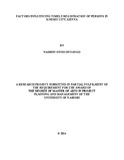| dc.description.abstract | Registration of Persons is undertaken in many countries worldwide for national socioeconomic,
security and political development. Kenya is not left behind and therefore one of the
countries which use identification card for the same development agenda. The government of
Kenya for the purpose of issuance of National Identity Card enacted registration of persons Act
chapter 107, Laws of Kenya. This act requires every Kenyan citizen who has attained the age of
18 years and above to register and obtain National Identification Card. According to the service
charter issued by the department of National Registration Bureau under the Act one receives
his/her National Identification Card within 37 days from the time of application. However,
people in Kisumu City and other parts of the country complain that they hardly receive their
National Identification Cards within the timeline stipulated in the service charter and that some
wait as long as 2 years. In countries like Rwanda, citizens can receive their National
Identification cards on the same day of application. Since National Identification cards are used
in important socio-economic, security and political development areas the delay in its issuance to
the Kenyan citizens deprives them the right to participate in the areas of development. The delay
denies Kenyans their right to register properties, to obtain travel documents, driving license,
register marriages, vote, be elected to political positions, register as a voter, employment,
education, open and close bank accounts, buy and sell properties, elect a person of their choice in
political office and obtain loans for college fees. The purpose of the study was therefore to
establish the factors influencing timely registration of persons in Kisumu City. The objectives of
the study were therefore to examine the influence of registration requirements and systems,
training of registration staff and infrastructure of the department on registration of persons. The
study was guided by the theoretical and conceptual framework. The literature review conducted
on the hypothesized factors had a bearing to the delay. The research was adopting a case study
method and targets a population of 1093 in Kisumu City. The respondents were ID card
applicants, Chiefs, Assistant chiefs, Id vetting elders and registration officials. The researcher
used interviewing guides and questionnaires as data collection instruments. The validity and
reliability of the research instruments were tested to ensure accuracy and consistency in
measurements. However before the researcher and his assistants moved for the survey consent
was sought from the University of Nairobi. Data collected was grouped, organized and
categorized according to specific objectives and research questions. Closed-ended questions
were awarded numerical scores when open-ended questions were analyzed on the basis of item
by item as answered by respondents. These were then organized using descriptive statistics;
frequency counts and percentages. The data was analyzed interpreted and summarized. The
findings of study confirmed that the registration requirements were not easily accessed,
centralized registration system was not efficient, registration officers were not adequately trained
and that inadequate and outdated infrastructure of the National Registration Bureau hamper the
effectiveness and efficiency of the department hence delay in registration of persons. In
conclusion the factors influence the registration of persons. The recommendations of the study
were that the department of registration of persons and other stakeholders should formulate
registration requirements which are easily accessed, decentralize production of Id cards to
counties, improve their human resource capacity and embrace use of current technology to
reverse the delay in registration of persons. | |

